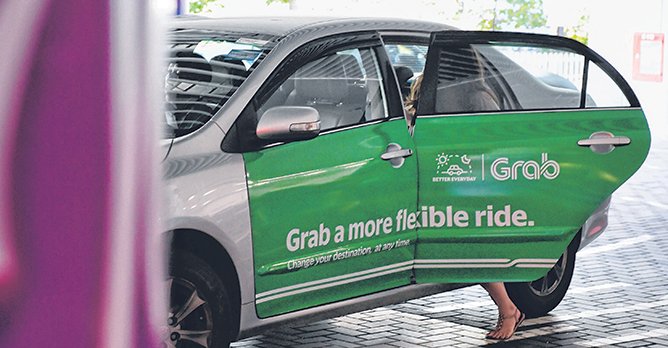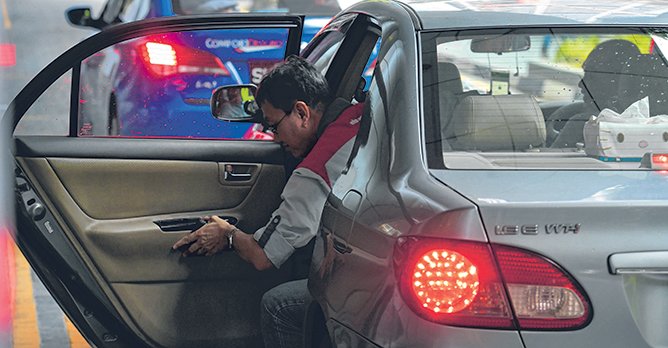Young private-hire drivers not in favour of minimum age limit
22 Aug 2019|9,648 views
While there have been calls to impose a minimum age limit for private-hire car drivers, younger drivers interviewed hope there will not be any such restrictions. They say driving is a good source of income and can be a viable career.

Cabbies currently have to be at least 30 years of age, but private-hire drivers just have to hold a driving licence for at least two years. They can get the licence from age 18.
Four MPs raised concerns about the low minimum age of private-hire drivers when Parliament debated the Point-to-Point Passenger Transport Industry Bill this month.
The legislation, which was passed, requires private-hire car companies, such as Grab and Gojek, to be licensed. But it did not address the issue of raising the minimum age of private-hire drivers.
For full-time private-hire driver Cedric Lim, who shares the sentiments of young drivers interviewed, the take-home pay is enough to make it a viable career. An engineering graduate, he said he became an Uber driver in 2015 because of his low starting pay as an engineer. Although the performance-based incentives that drew him initially to the sector have decreased, he can still make around $3,000 a month. "If I want to earn more, I just drive more," he said, adding that he drives for both Grab and Gojek.

Singapore has more than 41,000 private-hire driver vocational licence holders. Around 4% of them are aged between 20 and 24, and another 12% of them are aged between 25 and 29, Senior Minister of State for Transport Janil Puthucheary told Parliament. This translates to around 6,500 drivers under 30.
But Dr. Janil said raising the minimum age is not an easy decision, and that doing so would affect the number of drivers, reducing the rides available to commuters. There is no consensus on what this age should be, he added. MP Ang Hin Kee suggested 30, while MP Yee Chia Hsing proposed 25. Dr. Janil said the authorities would review the driver pool's size against the needs of the sector and study the issue of driver age carefully.
Last month, Minister of State for Manpower Zaqy Mohamad raised concerns that private-hire driving was becoming an attractive career choice particularly for those without academic qualifications. As freelancers, these drivers do not have Central Provident Fund or Medisave contributions.

Transport Economist Walter Theseira, of the Singapore University of Social Sciences, is concerned about the lack of opportunities for them to build meaningful experience. "Most gig economy jobs are deliberately designed to make labour a commodity, so that isn't conducive to individual skills development."
Indonesian company Gojek, however, contends that private-hire driving imparts a myriad of lifelong skills such as customer service as well as time and finance management skills. "All these skills build competence and confidence, are transferable and beneficial for any industry," said its spokesman.
Grab said it is fully supportive of drivers who want to upgrade themselves to transition to other careers, and that it works with agencies like SkillsFuture Singapore to identify relevant courses for them. PeopleWorldwide Consulting Managing Director David Leong believes that the rise in private-hire driving in recent years may just be a fad. "It is not a job the young will take up as a career, definitely not a life-long aspiration," he said.
Associate Professor Theseira believes it may be useful to have different systems regulating full-time and part-time private-hire drivers. "The flexibility to drive a bit on the side is probably helpful, but for those with skills that can get them a job in other industries, there are concerns for their long-term career outcomes should they persist in becoming full-time private-hire drivers."
While there have been calls to impose a minimum age limit for private-hire car drivers, younger drivers interviewed hope there will not be any such restrictions. They say driving is a good source of income and can be a viable career.

Cabbies currently have to be at least 30 years of age, but private-hire drivers just have to hold a driving licence for at least two years. They can get the licence from age 18.
Four MPs raised concerns about the low minimum age of private-hire drivers when Parliament debated the Point-to-Point Passenger Transport Industry Bill this month.
The legislation, which was passed, requires private-hire car companies, such as Grab and Gojek, to be licensed. But it did not address the issue of raising the minimum age of private-hire drivers.
For full-time private-hire driver Cedric Lim, who shares the sentiments of young drivers interviewed, the take-home pay is enough to make it a viable career. An engineering graduate, he said he became an Uber driver in 2015 because of his low starting pay as an engineer. Although the performance-based incentives that drew him initially to the sector have decreased, he can still make around $3,000 a month. "If I want to earn more, I just drive more," he said, adding that he drives for both Grab and Gojek.

Singapore has more than 41,000 private-hire driver vocational licence holders. Around 4% of them are aged between 20 and 24, and another 12% of them are aged between 25 and 29, Senior Minister of State for Transport Janil Puthucheary told Parliament. This translates to around 6,500 drivers under 30.
But Dr. Janil said raising the minimum age is not an easy decision, and that doing so would affect the number of drivers, reducing the rides available to commuters. There is no consensus on what this age should be, he added. MP Ang Hin Kee suggested 30, while MP Yee Chia Hsing proposed 25. Dr. Janil said the authorities would review the driver pool's size against the needs of the sector and study the issue of driver age carefully.
Last month, Minister of State for Manpower Zaqy Mohamad raised concerns that private-hire driving was becoming an attractive career choice particularly for those without academic qualifications. As freelancers, these drivers do not have Central Provident Fund or Medisave contributions.

Transport Economist Walter Theseira, of the Singapore University of Social Sciences, is concerned about the lack of opportunities for them to build meaningful experience. "Most gig economy jobs are deliberately designed to make labour a commodity, so that isn't conducive to individual skills development."
Indonesian company Gojek, however, contends that private-hire driving imparts a myriad of lifelong skills such as customer service as well as time and finance management skills. "All these skills build competence and confidence, are transferable and beneficial for any industry," said its spokesman.
Grab said it is fully supportive of drivers who want to upgrade themselves to transition to other careers, and that it works with agencies like SkillsFuture Singapore to identify relevant courses for them. PeopleWorldwide Consulting Managing Director David Leong believes that the rise in private-hire driving in recent years may just be a fad. "It is not a job the young will take up as a career, definitely not a life-long aspiration," he said.
Associate Professor Theseira believes it may be useful to have different systems regulating full-time and part-time private-hire drivers. "The flexibility to drive a bit on the side is probably helpful, but for those with skills that can get them a job in other industries, there are concerns for their long-term career outcomes should they persist in becoming full-time private-hire drivers."
Latest COE Prices
July 2025 | 2nd BIDDING
NEXT TENDER: 06 Aug 2025
CAT A$101,102
CAT B$119,101
CAT C$68,600
CAT E$120,000
View Full Results Thank You For Your Subscription.




















